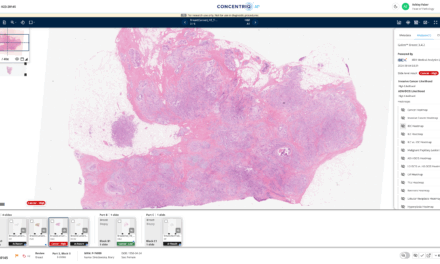The new platform automatically identifies clinical trial candidates at diagnosis, leveraging network expected to process 8 million pathology cases annually.
Proscia has introduced Proscia Aperture, an AI-driven precision medicine platform designed to identify clinical trial candidates automatically at the moment of diagnosis while providing biopharmaceutical companies with real-world evidence for drug development.
The Philadelphia-based pathology AI company says Aperture addresses a critical gap in precision medicine, where fewer than one in 10 cancer patients enroll in clinical trials. The platform leverages Proscia’s global laboratory network, which is expected to deliver more than 8 million pathology diagnoses this year through the company’s Concentriq platform.
“One of the hardest realities in precision medicine is that too many patients never have the chance to benefit from breakthrough therapies,” says Suso Platero, former chief scientific officer at Discovery Life Sciences, in a release. “Pathology data holds the keys to changing this. By unlocking insights at the moment of diagnosis, we can ensure that scientists have the understanding they need to bring the next treatments to market while giving patients a greater opportunity to access them.”
AI Integration Across Multiple Data Types
Aperture’s AI analyzes tissue images alongside AI-derived biomarkers, molecular results, and clinical records to generate evidence for regulatory submissions, companion diagnostic development, label expansions, and payer negotiations. The platform also surfaces eligible candidates for clinical trials and treatment programs.
The system draws from Proscia’s real-world data repository containing more than 12 million tissue images paired with clinical and genomic records. Patient privacy is protected through de-identification protocols and governance frameworks, according to the company.
“Diagnostic laboratories are under growing pressure to do more with fewer resources, even as demand for precision medicine continues to rise,” says Nina Green, vice president and general manager of the Clinical Diagnostics Division at Agilent Technologies, in a release. “Aperture opens an avenue with the potential to advance clinical trials, companion diagnostic development, and broaden patient access.”
Market Positioning and Industry Impact
The platform targets academic medical centers, healthcare systems, and reference laboratories seeking to differentiate their services and establish themselves as research-driving centers. By connecting routine pathology workflows with pharmaceutical research needs, Aperture aims to create a bridge between diagnostic and drug development processes.
Proscia reports that 16 of the top 20 pharmaceutical companies currently use its solutions. The company’s Concentriq AP-Dx platform holds FDA clearance for primary diagnosis in the US with specific slide scanner configurations and carries CE marking under EU IVDR for primary diagnosis.
“Aperture shows the world that pathology is no longer the end of the diagnostic journey but the driver of what comes next for patients,” says David West, CEO of Proscia, in a release. “By unlocking insights at the moment of diagnosis, we unite research and care, making the future of pathology a reality.”
The company plans to showcase Aperture at its Access25 virtual event on Oct 28 and is demonstrating the platform at the 37th European Congress of Pathology in Vienna.
Photo caption: Aperture
Photo credit: Proscia





